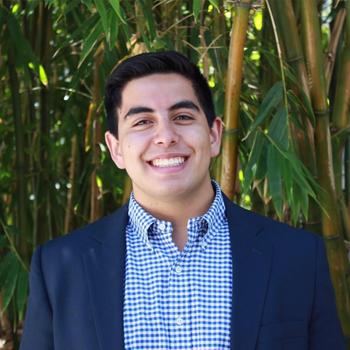Topics
In This Story
Master of Public Health provides knowledge and skills for hands-on role in infectious disease surveillance.

Before joining the Master of Public Health (MPH) program at Mason, Jorge Garcia explored his options for graduate school programs and soon became interested in studying public health. “I first read The Hot Zone by Richard Preston, and then I knew I wanted to work with infectious disease epidemiology,” Garcia said. “I knew of people who studied at Mason and enjoyed their experience, so an MPH in epidemiology was the next logical step, and I have loved the process of striving towards my goal.”
Due to the COVID-19 pandemic emerging soon after he joined the program, Garcia took on a role that allowed him to gain experience in helping prevent the spread of infectious diseases while also advancing in his coursework at Mason.
In June 2020, Garcia joined the Fairfax County Health Department as a community health worker, where he connected individuals in quarantine and isolation with needed materials and resources, such as groceries, hygienic products, medicine, rental assistance, at-home COVID-19 tests, cleaning supplies, and face masks.
“I would drive to their homes and drop off requested materials, as it was our priority to meet people where they are and make sure they did not leave their home during quarantine to get essential items,” Garcia said.
Educating the Community on Vaccines
As vaccines became more readily available, Garcia transitioned to a new role as a vaccine navigator within the health department to increase vaccination rates, educate members of the community, and address concerns about the vaccine.
“As a vaccine navigator, I interact with people who may be hesitant about receiving the vaccine and educate them on the facts about the vaccines,” Garcia said. “I have worked at community events, vaccine clinics, schools, food drives, churches, and even door-to-door in this capacity. It’s always a win when you can [help] others to get vaccinated after a great conversation.”
While Garcia found the work rewarding, he spoke on how it was challenging to overcome the social determinants of health that affected the communities he served.
Overcoming Challenges
“There are many unique, invisible barriers that the LatinX community face that prevent them from accessing resources or health care,” Garcia said. “An example of one challenge I frequently overcame was transportation to a vaccine clinic. I knew of county resources that [would] pick people up and drive them [to and from] a clinic. Additionally, many did not have email, so I had all my materials printed in Spanish and delivered to their homes.”
When asked what skills he acquired from this experience, Garcia noted how the challenges only enhanced his preparations to becoming a leader in the public health field. “I have had to be flexible, resilient, and adaptable to challenges faced by the community,” Garcia said. “A lot of conversations don’t go according to plan, and learning to speak to all sorts of people has been a critical skill.”
Excelling at Mason
Reflecting back on the courses he’s taken at Mason, Garcia is confident that his classes trained him for his roles with the Fairfax County Health Department. “It feels as if what I learn in class relates immediately to work and vice versa,” Garcia said. “My epidemiology classes gave me a solid understanding for when we had our data meetings to understand trends in COVID-19 cases or vaccinations in the county and targeting areas where we could improve vaccinations.”
Garcia also noted how his biostatistics courses, such as Biostatistics for Public Health II (GCH-805), led by Jenna Krall, PhD, assistant professor in the Department of Global and Community Health, also helped him prepare for the real-world situations he encountered as a vaccine navigator.
“I love the structure of [GCH] 805 because it simulates a real-world working environment,” Garcia said. “We have learned how to use R [programming language] to work with data sets, find measures of spread, and perform statistical analyses among other things. The flexibility of choosing our hypothesis and running whatever analyses we decided upon helped me learn the material much better and felt like a project or task one would receive at work.”
After he completes his MPH degree, Garcia’s goal is to work as an epidemiologist for the Centers for Disease Control and Prevention (CDC), the Pan American Health Organization(PAHO), or the National Institutes of Health (NIH). “I want to work with infectious disease surveillance in the future, and Mason has helped me in my goals thus far,” Garcia said.
